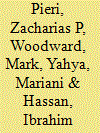|
|
|
Sort Order |
|
|
|
Items / Page
|
|
|
|
|
|
|
| Srl | Item |
| 1 |
ID:
131477


|
|
|
|
|
| Publication |
2014.
|
| Summary/Abstract |
This paper examines the concept of (public) sin as well as efforts to counteract sin from the perspective of Islam. The understanding that hisba, the prohibition of vice and enjoining of virtues, are a responsibility of both the state and the community is common in historical and contemporary Muslim societies. Where the state cannot or does not provide means for countering (public) sin, the perception for some Muslims is that the responsibility on the community and individuals to do so increases. Based on ethnographic research in Britain, Nigeria, Indonesia, Malaysia, and Singapore, the paper highlights examples of how sin has been defined amongst Muslim communities as well as the methods and rationales given to justify the forbidding of sin as a collective and communal public obligation. As the world becomes more integrated, there is growing concern amongst Muslim communities that sin is becoming the norm, leading society to degeneracy, that people who would not have otherwise sinned are influenced to do so. Common features in forbidding sin across Muslim communities have appeared, often focusing on what are seen as moral issues such as dress codes, music, gambling, alcohol, smoking, and the mixing of men and women in public. The forbidding of sin has resulted in attempts to introduce "Shari'a Zones" in some predominantly Muslim areas of London, whilst in Indonesia, this has given rise to the Islamic Defenders Front and in some Northern Nigerian states to the reintroduction of the criminal codes of the Shari'a.
|
|
|
|
|
|
|
|
|
|
|
|
|
|
|
|
| 2 |
ID:
191526


|
|
|
|
|
| Summary/Abstract |
White extremism in the U.S. has not received much attention in the literature, despite scholars arguing that it represents the most sustained form of terrorism in the U.S. While much of the research on extremist movements has focused on the groups’ violent acts, there has been significantly less attention on the nonviolent activities, such as music. Following a social movement theoretical framework, we set out to understand the role that music plays in constructing the worldview and narrative of white extremists. Using lyrics from 337 white power songs from seven white power bands, we analyzed the linear and interconnected narrative that emerges in the music. What we found is a narrative interwoven throughout the music that presents a clear picture of white societies under threat from immigration, the Jewish-controlled media, and liberalism, with clear directives for extreme violence and vigilante justice. Based on this picture, we discuss the potential counterextremism implications and provide several avenues for future research.
|
|
|
|
|
|
|
|
|
|
|
|
|
|
|
|
| 3 |
ID:
162481


|
|
|
|
|
| Summary/Abstract |
Boko Haram's operations and ideology have been the subject of increasing research in recent years. This article, in contrast, explores the culture of Boko Haram through an ethnographic analysis of the group's internal videos that were not intended for public release. The authors find that in their everyday lives Boko Haram foot soldiers are different from the image the group presents to the world in propaganda videos. While unmistakably a violent movement, in territories under the group's control that it attempted to administer, foot soldiers participated in conflict resolution with elders, explained the group's position on external alliances to villagers, engaged in recreation to pass time off the battlefield and created bonds of solidarity with other members of the group. Using insights from anthropology and the examination of ‘Jihadi Culture’, this article's insights help us understand how and why Boko Haram foot soldiers fight beyond the group's public ideology or stated goals: for many of them, it is simply a lifestyle.
|
|
|
|
|
|
|
|
|
|
|
|
|
|
|
|
|
|
|
|
|